|
|
|
Sort Order |
|
|
|
Items / Page
|
|
|
|
|
|
|
| Srl | Item |
| 1 |
ID:
181811
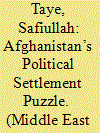

|
|
|
|
|
| Summary/Abstract |
The rapid collapse of the Afghan Republic in August 2021 was in part the result of two decades of disintegrating political parties at the hands of former Presidents Karzai and Ghani. After the 2001 US intervention, political parties did not play a significant role in the politics of Afghanistan. The country’s nascent democracy experienced major shifts in the aftermath of the US intervention, largely concerning the behaviour and structure of its parties, which impacted the government’s prospects of reaching a political settlement. In this period, politics began to shift toward a more elite-centric model. By applying a political settlement conceptual framework and case studies, especially with reference to the presidential elections, this article argues that the transformation to an elite-centric model intensified political rivalries in Afghanistan. The resulting polarisation consequently had decreased Afghanistan’s chances of reaching a political settlement, an essential component of state-building in this fragile, linguistically fragmented country with multiple politico-military factions.
|
|
|
|
|
|
|
|
|
|
|
|
|
|
|
|
| 2 |
ID:
159695


|
|
|
|
|
| Publication |
New Delhi, Bloomsbury, 2018.
|
| Description |
ix, 175p.hbk
|
| Standard Number |
9789386826473
|
|
|
|
|
|
|
|
|
|
|
|
Copies: C:1/I:0,R:0,Q:0
Circulation
| Accession# | Call# | Current Location | Status | Policy | Location |
| 059408 | 923.2/DIK 059408 | Main | On Shelf | General | |
|
|
|
|
| 3 |
ID:
146701
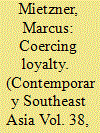

|
|
|
|
|
| Summary/Abstract |
Scholars of coalitional presidentialism have focused on the question of how presidents in multi-party systems manage to establish stable governments. Some authors have argued that in the case of Indonesia, post-authoritarian presidents have prioritized inclusivist alliance building, with all parties offered cabinet seats and other rewards in exchange for loyalty. However, as this article demonstrates, President Joko Widodo has opted for a more coercive approach: reactivating power tools not used since the days of Suharto’s autocracy, he intervened in the internal affairs of at least two opposition parties and eventually forced them to declare their support for his administration. This method, while designed to obstruct the anti-democratic agenda of the opposition, has in itself had detrimental effects on Indonesia’s democratic quality.
|
|
|
|
|
|
|
|
|
|
|
|
|
|
|
|
| 4 |
ID:
153422


|
|
|
|
|
| Summary/Abstract |
Cambodia’s youthful population is significantly responsible for a recent unexpected decline in the popularity of the Cambodian People’s Party, which has governed since the end of the Khmer Rouge regime. This increasingly young electorate has lived through an era of peace and openness with regular multi-party elections and impressive economic growth resulting in rapid structural change in the economy. Compared to their parents’ generation, this younger generation is better educated, highly mobile, aspires to salaried employment, and is well connected to new sources of information and technology. Because of this, their expectations, aspirations, opportunities, as well as challenges they face are remarkably different from those of older generations. However, Cambodia’s institutions of governance, dominated by personalized and patron–client networks that have been propped up by the ruling elite, has effectively marginalized this emerging youth population. This marginalization from political and economic resources has produced alienation and discontent, which represents a significant political problem for the ruling party’s political strategies.
|
|
|
|
|
|
|
|
|
|
|
|
|
|
|
|
| 5 |
ID:
185525
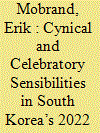

|
|
|
|
|
| Summary/Abstract |
Why was South Korea’s 2022 presidential election so close, when only a few years prior the party of the winning candidate had been out of contention? The answer can be found by situating the election against a battle between democratic and anti-democratic forces. Anti-democratic forces cynically bid for power by denigrating politics. An examination of how this cynical sensibility developed, from 2016 to 2022, but on the back of a deeper history, points both to what was at stake in this election and to the methods deployed by representatives of the anti-democratic forces that helped create parity in the vote.
|
|
|
|
|
|
|
|
|
|
|
|
|
|
|
|
| 6 |
ID:
139909
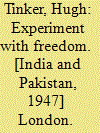

|
|
|
|
|
| Publication |
London, Oxford University Press, 1967.
|
| Description |
x, 165p.pbk
|
|
|
|
|
|
|
|
|
|
|
|
Copies: C:1/I:0,R:0,Q:0
Circulation
| Accession# | Call# | Current Location | Status | Policy | Location |
| 010836 | 954.0359/TIN 010836 | Main | On Shelf | General | |
|
|
|
|
| 7 |
ID:
105355
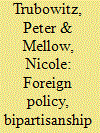

|
|
|
|
|
| Publication |
2011.
|
| Summary/Abstract |
The attacks of September 11 and the resulting war on terrorism present a puzzle to conventional explanations of foreign policy bipartisanship. Public anxiety about the international environment increased sharply after the attacks in 2001, but this did not translate into greater foreign policy consensus despite the initial predictions of many analysts. In this article, we advance a theory of foreign policy bipartisanship that emphasizes its domestic underpinnings to explain the absence of consensus in Washington. We argue that bipartisanship over foreign policy depends as much on domestic economic and electoral conditions as on the international security environment. Using multivariate analysis of roll call voting in the House of Representatives from 1889 to 2008, we show that bipartisanship over foreign policy is most likely not only when the country faces a foreign threat but also when the national economy is strong and when party coalitions are regionally diverse. This was the case during the Cold War. Despite concern about terrorism in recent years, economic volatility and regional polarization have made bipartisan cooperation over foreign policy elusive.
|
|
|
|
|
|
|
|
|
|
|
|
|
|
|
|
| 8 |
ID:
142601
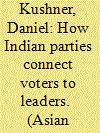

|
|
|
|
|
| Summary/Abstract |
How do political parties in developing countries, without access to accurate polling data, understand their voters? I examine the role that various sources of information play in political party platforms, and how the method of data collection affects parties’ policy and political efforts, primarily by using interview data from 2012 and 2013 with workers from four leading parties in Uttar Pradesh, India’s most populous state. I theorize the role of party workers as a key conduit for information between party leaders and the voters they represent.
|
|
|
|
|
|
|
|
|
|
|
|
|
|
|
|
| 9 |
ID:
083264
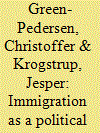

|
|
|
|
|
| Publication |
2008.
|
| Summary/Abstract |
Abstract. Studies of party politics and party competition in West European democracies all point to diversification. Non-economic issues such as the environment, refugees and immigrants or law and order have become increasingly central to party politics. However, there has been surprisingly little interest in explaining variation across time and countries concerning which issues actually become central to party competition. From the sparse literature, two general answers can be discerned. One is societal, focusing on mass media coverage, public opinion and the development of the policy problems related to the issue. The other focuses on the structure of party competition itself - more precisely on the incentives for different parties in drawing attention to different issues. This study stresses the importance of the latter based on a study of the immigration issue in Denmark and Sweden. Party political attention to this issue in the 1990s has been considerably stronger in Denmark than in Sweden. This can be explained by the different strategic situation of the main stream right-wing parties in the two countries. Focusing on the immigrant issue easily leads to a conflict with the centre-right, especially social liberal parties. In Sweden, such a conflict would undermine mainstream right-wing attempts at winning government power. In Denmark, the Social Liberals governed with the Social Democrats in the 1990s, which made it attractive for the main stream right-wing parties to focus on the issue in order to win government power based on the support of radical right-wing parties
|
|
|
|
|
|
|
|
|
|
|
|
|
|
|
|
| 10 |
ID:
123216
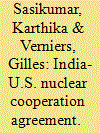

|
|
|
|
|
| Publication |
2013.
|
| Summary/Abstract |
The U.S.-India civil nuclear energy agreement triggered a contentious debate in India from 2005 to 2008. Regional political actors played crucial and unanticipated roles in the debate. We present explanations for the positions adopted by the main actors and the level of contention. We find that parties' positions were driven not by ideology but by the compulsions of coalition politics.
|
|
|
|
|
|
|
|
|
|
|
|
|
|
|
|
| 11 |
ID:
120316
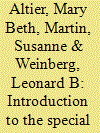

|
|
|
|
|
| Publication |
2013.
|
| Summary/Abstract |
At a White House banquet held in his honor in March 1954, Winston Churchill observed that it was better to "jaw-jaw" than "war-war." In the Cold War atmosphere of the time (Stalin had died the previous year), Churchill was maintaining that talking with the Soviet leadership was better than a nuclear confrontation between the two superpowers. Who would argue otherwise?
|
|
|
|
|
|
|
|
|
|
|
|
|
|
|
|
| 12 |
ID:
059072
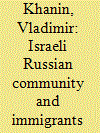

|
|
|
| 13 |
ID:
137905
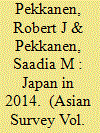

|
|
|
|
|
| Summary/Abstract |
It was all about Abe in 2014. With few intra-party challengers, a divided and weak opposition, and a huge victory in a December snap election gamble, Japan’s Prime Minister Abe finds unusual scope to lead the nation both domestically as well as internationally in his chosen course of ‘‘proactive pacifism.’’
|
|
|
|
|
|
|
|
|
|
|
|
|
|
|
|
| 14 |
ID:
148088
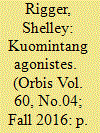

|
|
|
|
|
| Summary/Abstract |
Taiwan's Kuomintang (KMT) lost badly in the 2016 elections. The KMT had not garnered favorable public opinion under the previous president, Ma Ying-jeou. Nor were Ma and his party seen as promoting a vision to put Taiwan first. Consequently, they were defeated soundly by the Democratic Progressive Party. This article addresses how the parties differ historically and why it matters what direction Taiwan's leadership takes in the future.
|
|
|
|
|
|
|
|
|
|
|
|
|
|
|
|
| 15 |
ID:
192890
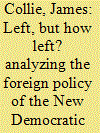

|
|
|
|
|
| Summary/Abstract |
This article analyzes the modern foreign policy of the New Democratic Party of Canada (NDP). It uses the framework of Aaron Ettinger's work in the International Journal on an emerging left-wing in the US Democratic Party. I first situate the research within the existing literature on leftist internationalism, Canadian foreign policy, and the New Democratic Party. I then analyze a dataset that I created based on the last five NDP federal election platforms and use it to analyze 210 different foreign policy commitments. I use these findings to argue two things: (1) the NDP has a comprehensive foreign policy that reflects dual struggles of electability and left-wing ideals; (2) there is no identifiable left-wing turn in recent NDP platforms. I conclude this article with a discussion on the future of NDP foreign policy.
|
|
|
|
|
|
|
|
|
|
|
|
|
|
|
|
| 16 |
ID:
120322
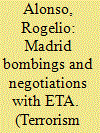

|
|
|
|
|
| Publication |
2013.
|
| Summary/Abstract |
This article analyzes the impact that two terrorism-related matters had on Spanish politics and electoral processes in the country. First, the article analyzes the terrorist attacks perpetrated by jihadists on March 11, 2004, three days before Spain's general election. The indiscriminate, lethal attacks caused a state of shock in the country, brought the election campaign to a sudden end, and led to the defeat of the party in power. Second, the article analyzes the negotiations entered into with the ETA terrorist organization by the new government during its first term, from 2004 to 2008. This controversial step, upheld by the Spanish government despite massive opposition by civil society and the main opposition party, failed to bring about the end of ETA. Both the Madrid attacks and the negotiations with ETA were responsible for the breakdown of the consensus in regard to terrorism that had existed among the main Spanish political parties. The article analyzes how both events generated an unprecedented level of polarization and tension among political parties and society from 2004 to 2008, and how each event had a different impact on the general elections held during that period. The period under examination provides an example of adversarial politics; terrorism was highly influenced by the management of both events by the main political players.
|
|
|
|
|
|
|
|
|
|
|
|
|
|
|
|
| 17 |
ID:
172466
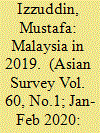

|
|
|
|
|
| Summary/Abstract |
After the stunning victory of Pakatan Harapan (Alliance of Hope) over the incumbent Barisan Nasional (National Front) in May 2018’s 14th Malaysian General Election, 2019 was a year of political transition, with Pakatan governing, Barisan rising from its political grave, and the Malaysian people getting accustomed to a two-party coalition system. In a chaotic year of party-political and electoral fatigue, social discontent, and economic slowdown, Malaysia endured its domestic troubles to remain a stable country.
|
|
|
|
|
|
|
|
|
|
|
|
|
|
|
|
| 18 |
ID:
160114
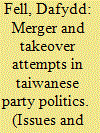

|
|
|
|
|
| Summary/Abstract |
Taiwan has experienced a number of party splits and attempted mergers since democratization. These have played a critical role in the development of the country’s party system. While a number of studies have looked at the emergence of Taiwan’s splinter parties, party mergers have not received academic attention. This study aims to systematically examine the process of party mergers and takeovers. We examine four cases of attempted mergers and takeovers. In each case, we focus the analysis around three core questions: (1) How should we best classify the actual outcomes? (2) How we can best explain the variation in outcomes? (3) How can we assess the success of merger/takeover attempts? Unlike earlier studies, we examine a variety of merger outcomes rather than just successful cases. In addition to mergers, we propose the terms negotiated takeovers and hostile takeovers. Our classification scheme is based on relative party power and the inter-party relationship. To explain the variation in outcome, we applied a framework stressing the interplay of contextual, inter-party and inner-party factors. We found key contextual variables were electoral results, relative party sizes and the electoral system. The most important inter-party variables were ideological proximity and inter-party trust following successful cooperation. Lastly, the inner-party balance of power was also critical, particularly, the strength of leaders with favorable attitudes toward the merger project. We assess the success and failure of merger/takeover attempts with reference to election results, post-merger party unity and whether the post-takeover relationship was cooperative.
|
|
|
|
|
|
|
|
|
|
|
|
|
|
|
|
| 19 |
ID:
184905
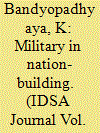

|
|
|
| 20 |
ID:
161403
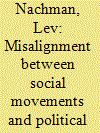

|
|
|
|
|
| Summary/Abstract |
Why would opposition movement activists not support an established opposition political party? Taiwan’s 2016 presidential election is apropos. This study shows that the Democratic Progressive Party lost support from leftist activists not only because of ideological distance but because they see the party as flawed and ineffective. But activists still voted strategically for Tsai Ing-wen and the DPP to thwart the Nationalist Party from winning the election.
|
|
|
|
|
|
|
|
|
|
|
|
|
|
|
|
|
|
|
|
|